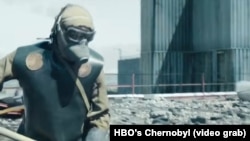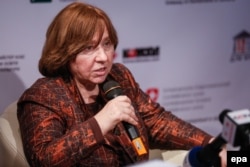On June 13, Russia’s Regnum news agency published a review of the HBO miniseries “Chernobyl” written by Dmitry Yevseyev, leader of the local branch of the Communist Party of the Russian Federation (KPRF) in the western Russian city of Cheboksary, who also works as an aide in the State Duma, the lower chamber of Russia’s parliament. The piece, headlined “The Chernobyl Series –Radioactive Propaganda,” was accompanied by a Soviet-era cartoon vilifying the Voice of America, the U.S.-government international broadcaster. The relationship between that cartoon and the HBO series is not clear.
The Regnum article claimed the miniseries “is packed with petty anti-Soviet filth, which poisons viewers’ brains, thus becoming a deliberate, well-thought-out distortion of Soviet reality.”
That claim is false.
The HBO miniseries “Chernobyl” is a dramatization of the 1986 nuclear disaster in Soviet Ukraine, one of the worst man-made catastrophes in history. The series, which has become a global phenomenon since its release on May 6, has been highly praised for its accurate presentation of the events before, during and after the disaster.
Adam Higginbotham, author of the book, "Midnight in Chernobyl," told CBSN the production design was "extraordinary."
“They are clearly aiming to offer a drama accountable to fact rather than merely exploit the setting to hang a fictional story,” wrote Carl Willis, who teaches nuclear engineering classes at the University of New Mexico and is a frequent visitor to Chernobyl, in a review of the series.
The Belarussian Nobel laureate Svetlana Alexievich, who was initially skeptical when Chernobyl’s creators asked for permission to use material from her book “Voices from Chernobyl,” also spoke highly of the series.
"We are now witnessing a new phenomenon that Belarusians, who suffered greatly and thought they knew a lot about the tragedy, have completely changed their perception about Chernobyl and are interpreting this tragedy in a whole new way. The authors accomplished this,” Alexievich said.
Chernobyl’s writer, creator and executive producer, Craig Mazin, said Alexievich’s review was “the best” the miniseries had received.
HBO released the following statement:
“Craig Mazin began researching the Chernobyl disaster in 2014, using a wide variety of materials, including several books, government reports from inside and outside of the Soviet Union and first-person accounts. He spoke to nuclear scientists to learn how a reactor works and interviewed former Soviet citizens to gain a better sense of the culture in 1986.”
Russian filmmaker Michael Idov tweeted after watching the first episode that there had not been “a single false note,” adding “it is embarrassing - to me as a Russian cultural producer - to watch HBO do the very memory work Russian pop culture has abdicated.”
In a Twitter thread, the Times of London’s Moscow correspondent, Tom Parfitt, compiled reviews of how people in Russia have reacted to Chernobyl:
“Inside Russia, people have been watching it on an HBO partner site or on high-quality pirate sites. Responses range from bilious via perceptive/valid criticism to liberal praise.”
The series’ popularity in Russia sparked a reaction from state and Kremlin-friendly media.
“It seems every major Russian media outlet had to chime in about the ’Chernobyl’ TV series by HBO,” the Moscow Times correspondent Ilya Shepelin wrote in his analysis of the reaction of Russia’s pro-government media to the series. “Although the foreign program airs only online to paying viewers, the show has become something of a national sensation in Russia, where the pro-Kremlin media have launched a mini-crusade against it.”
One of Russia’s most popular pro-government TV channels, NTV, announced in June that it plans to air its own Chernobyl series, which will suggest that a CIA saboteur was behind the disaster. Production of that series began in 2018.
The NTV Chernobyl series reportedly has received Russian-government support via a $460,000 grant from the Ministry of Culture.
Reflecting on the tonal shift in reviews of HBO’s “Chernobyl” inside Russia, Svetlana Alexievich blamed the change of opinion on the Kremlin.
"In the beginning, Russian media was very positive about the series and then probably there was some yelling in the Kremlin and they suddenly became very patriotic,” she said. “Then there was news they are launching their own series about Chernobyl, about how 'our' agents pursue some American spy at the power plant. My God, when I read all this I thought, that 30 years have passed and has really nothing changed in the consciousness?"









